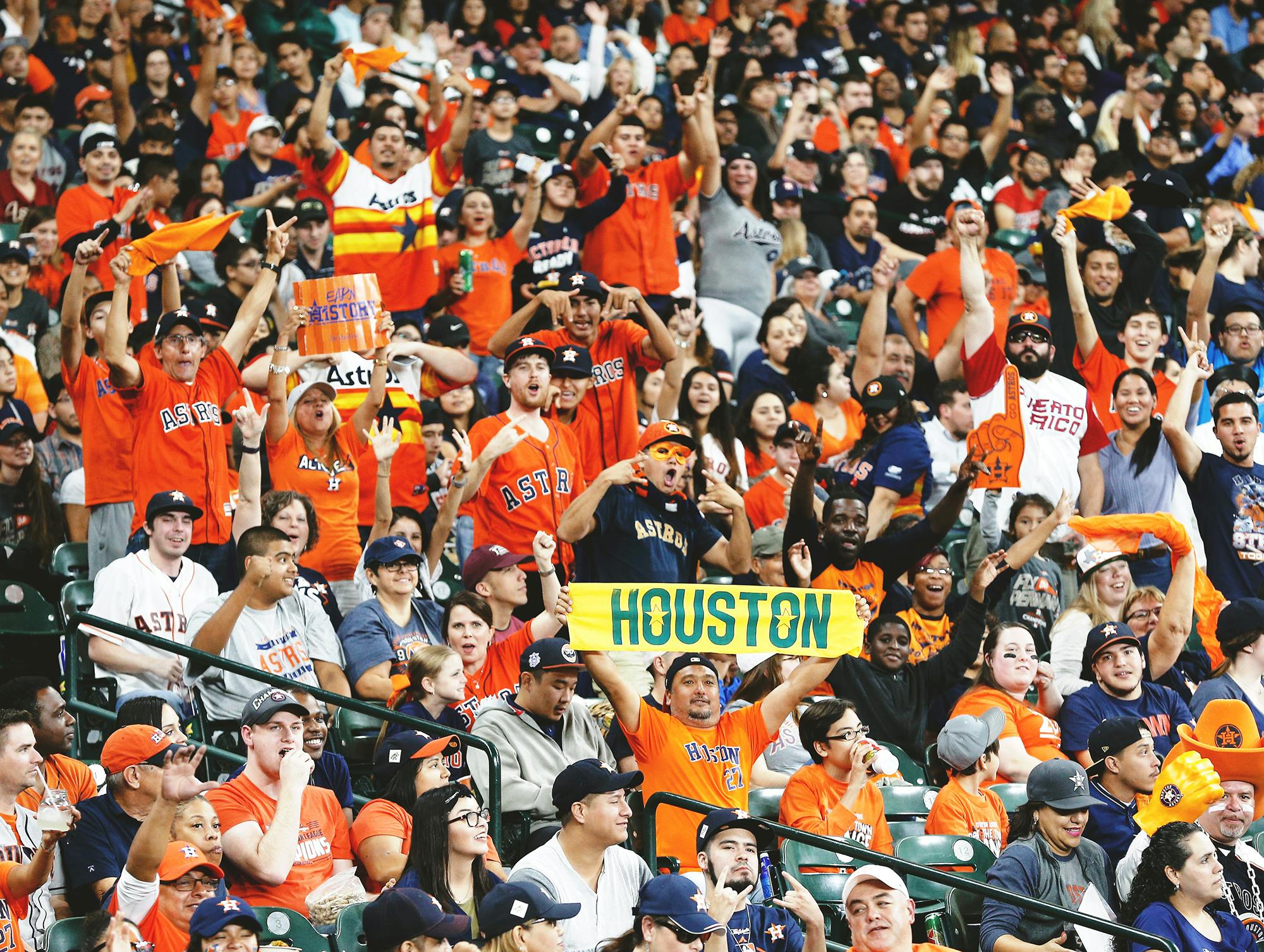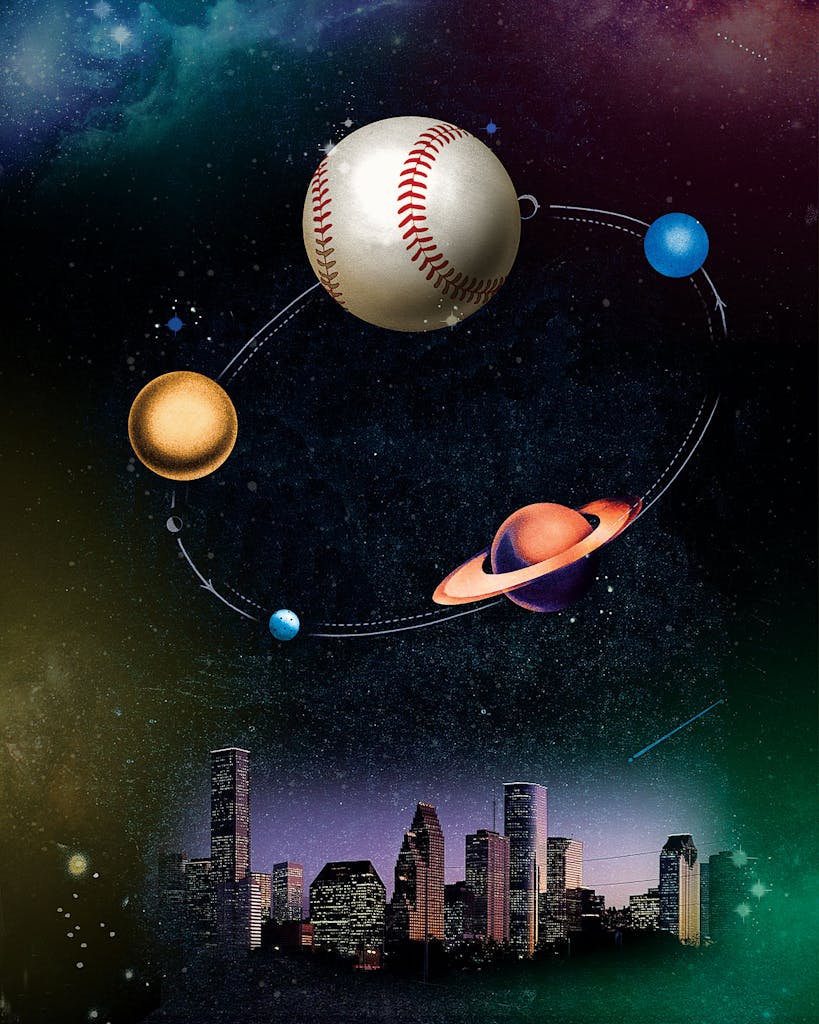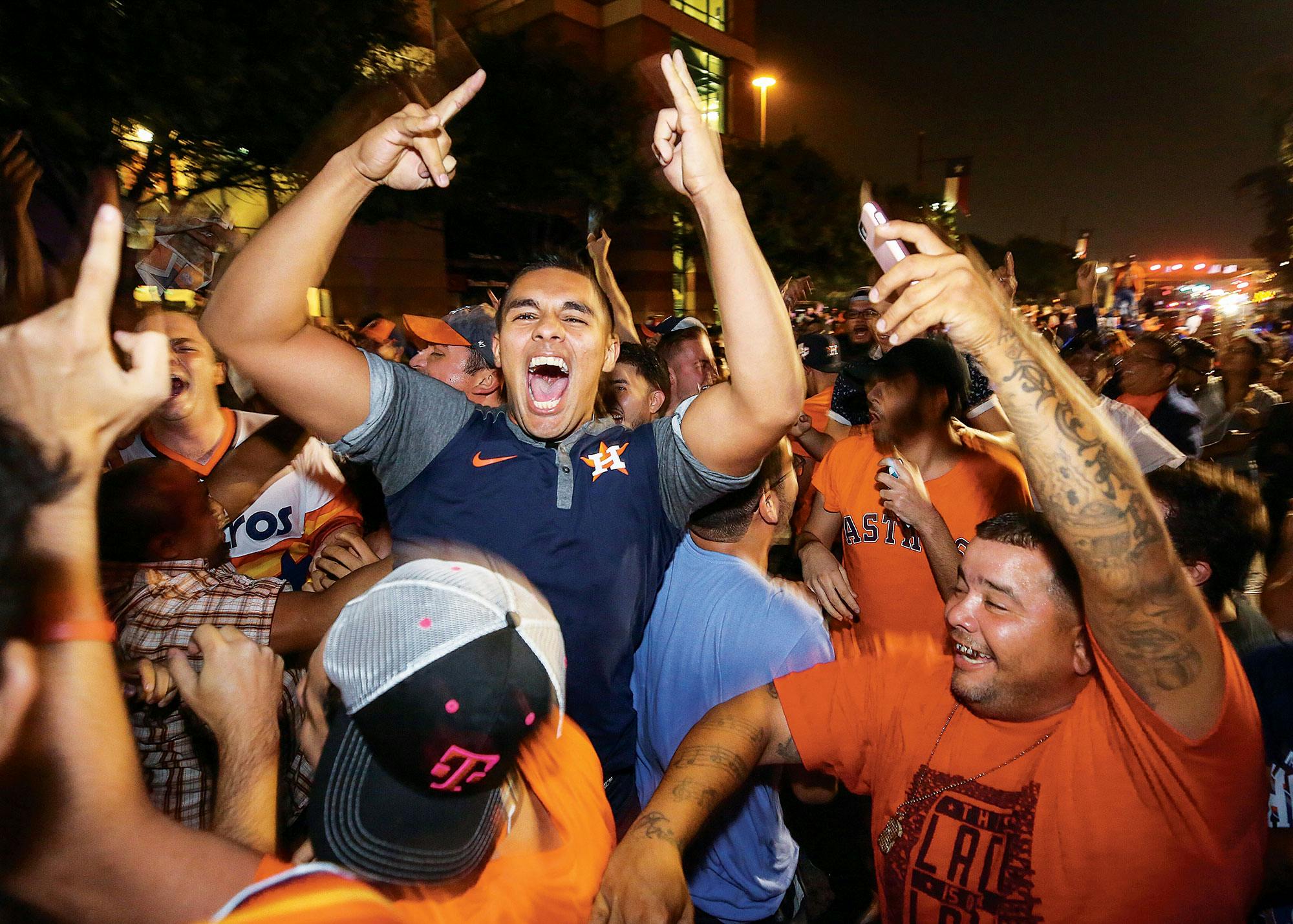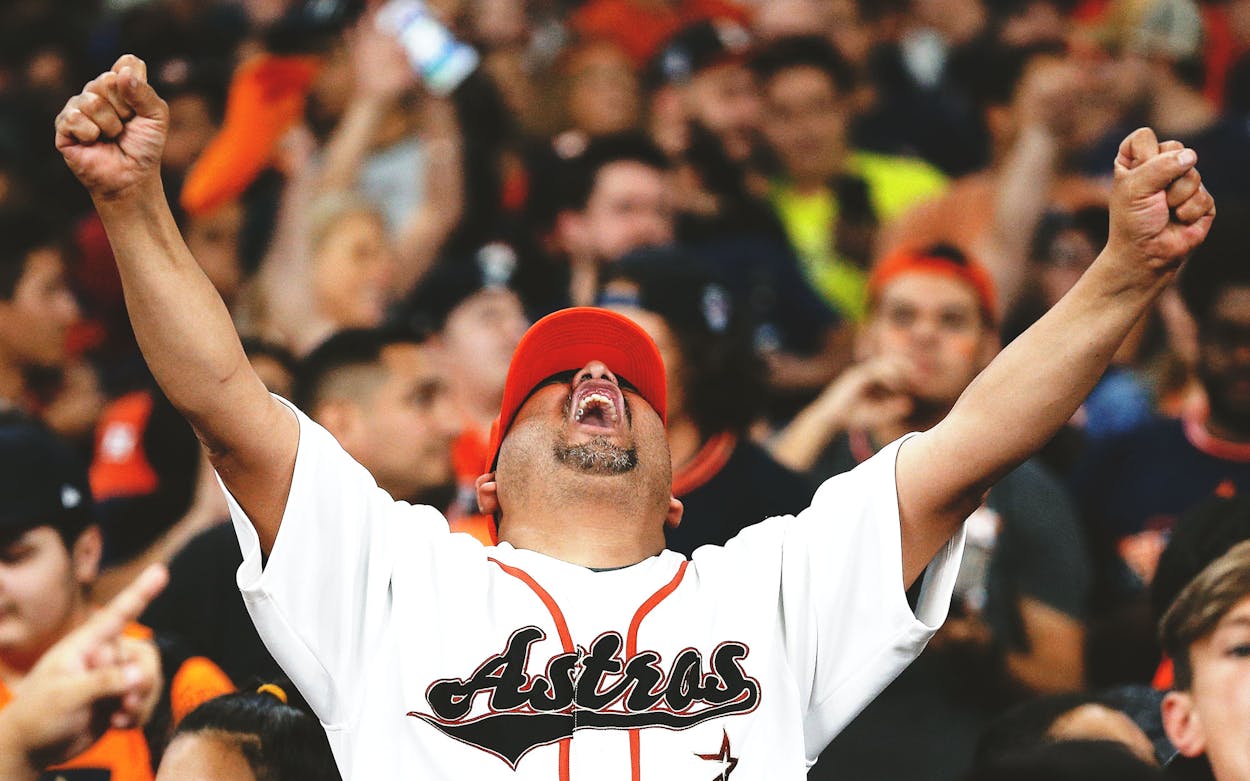Astros fans felt a familiar ache during this year’s League Championship series. After getting a two-game lead on the Yankees at home, the series went to New York, where the Astros’ bats fell silent. The Yankees proceeded to churn out three decisive wins in a row.
It looked like the Astros had blown it. Again. Forty-plus-year Astros fan Clint Heider spoke for many of his long-suffering brethren in a Facebook post on October 18, during game five against the Yankees. “And so the great unraveling of the Astros’ season finally begins,” he wrote. “All the same, a great run by a great team. In a better world, we’d go to the World Series but we all know what world we live in . . . I’ve been in this town half a century, and if there’s one thing I believe in, it’s that our sports teams are eternally cursed. It’s really not even worth arguing about.”
As someone who has rooted for the Astros since the age of ten, I didn’t blame Heider for his gloomy outlook. I too succumbed to doom-laden thinking throughout the team’s path to the World Series: I publicly lambasted a chicken-wing restaurant for its overconfident marquee. I began to trace curses back through decades-old rosters. I studied historical patterns indicating that, ultimately, we were destined to fail.
In short, I didn’t think this would end well.
“I think Houston is some kind of great cosmic joke being played on all its inhabitants,” Heider wrote. “I don’t believe in God, but I could be convinced that God might exist as a slightly malevolent, if humorous, force.”
Maybe that’s so, but this time God laughed at the Yankees. And again at the Dodgers.
This season, this team, and this World Series in particular left Astros fans in a state of disbelief. We’ve seen the extra innings and dramatic walk-offs in the postseason before. They were there during the franchise’s first appearance in the playoffs, in 1980, which ended with a loss to the Philadelphia Phillies. The New York Mets came out on top of the epic struggle for the 1986 National League Championship. In 2004, it was the St. Louis Cardinals’ turn to destroy dreams of Astros glory. And any hopes for a vengeance-fueled World Series victory in 2005 were dashed when the White Sox shut us out in a four-game sweep.
We’ve seen the drama. We’ve just never seen the Astros overcome it.
And so from Beaumont to Corpus, Brenham to Fairfield, we awoke on November 2 and pinched ourselves. We won the World Series. For the first time in Astros history, Lucy didn’t snatch the football away at the last second.

Fans erupt after George Springer of the Houston Astros hits a home run against the Los Angeles Dodgers as they watch during the Houston Astros World Series watch party at Minute Maid Park on October 31, 2017 in Houston, Texas.
To know the Astros was to dread them. For 55 years we were the comeback kids who never came all the way back. We watched expansion teams like the Toronto Blue Jays and Florida Marlins come into the league and win not one but two World Series titles before we ever so much as made it to a single one. The Arizona Diamondbacks, utter newbies, took down the Yankees in 2001. Like the Astros, the Mets were born in 1962, and they famously pulled off their miracle in ’69 and won it all again in ’86 (after they beat us in the postseason). Though we couldn’t pull it off ourselves, we managed to extend a helping hand to other perennial losers: one of the longest World Series champion droughts in baseball history—the White Sox (88 seasons)—was broken at the expense of the Astros.

The world spun on as the Astros continued to disappoint: the Kennedy assassination. Beatlemania. Vietnam. Civil rights. The MLK assassination. The moon landing (the lead-up for which inspired the rebranding of the Colt .45s as the Astros). Watergate. The Iran hostage crisis. Two Gulf wars. The L.A. riots. The O.J. trial. The Lewinsky affair. The fall of the Houston Oilers. The rise of the internet. September 11. Two generations of Bushes in the White House. Tropical Storm Allison. Hurricanes Alicia, Rita, Ike, and Harvey.
Meanwhile, the Astrodome slowly descended from Eighth Wonder of the World to Old and In the Way. The Astros sustained J. R. Richard’s stroke and the near-blinding of Dickie Thon. Ownership frittered away Nolan Ryan while he still had a few good years in the tank. The Killer B’s never quite stung as effectively as we hoped, and the homecomings of Houston-bred pitchers Roger Clemens and Andy Pettitte ended in on-field heartbreak and, thanks to steroids, off-field acrimony. We moved stadiums. We embarked on a horrific four-season slump, bottoming out with no guarantee that the front office’s analytics-based approach would ever pay off. And—indignity of indignities—we were frog-marched, kicking and screaming, to the American League. The only consistency in it all was that the Astros continued to disappoint.
In 2015, it looked as if things were finally turning around for the ’Stros. We’d squeaked into the postseason with a wild-card win against the Yankees—our first appearance in the playoffs since our 2005 meltdown. After a dramatic back-and-forth, the Kansas City Royals delivered a 7–2 drubbing in game five and clinched the American League Division Series. We’d looked better than we had in a decade, but we were ultimately only stepping stones for the eventual 2015 World Series champs.
And then, the 2017 postseason. We watched in near disbelief as the boys—back home for the last two games of the series with the Yankees—clinched their second-ever World Series appearance just as handily as they had been beaten in New York.
Cheryl Clark, an Astros devotee who Texas Monthly profiled last year, has weathered the peaks and valleys of fandom. She cheered as Roger Clemens and Hall of Famers Craig Biggio and Jeff Bagwell took the team to the 2005 World Series, only to be swept by the White Sox. If there’s anyone who knows about cautious optimism and self-preservation—two necessary traits for Astros die-hards—it’s Clark. But when I spoke to her before the World Series, she felt something was different about this lineup.
“I don’t want to say those teams were defeatist, but they didn’t have the same vibe,” Clark said of the Astros’ previous postseason squads. “I don’t know that I believed then that those teams would make it, and I don’t know that they did either.”
I felt it too. By the time these new Astros rallied to defeat the Yankees, they had made believers of us all.
How could anyone not believe in José Altuve, whose small stature belies his bulldog tenacity and astounding power? Or lithe and graceful Carlos Correa, the Platonic ideal of a five-tool ball player? Or rugged Justin Verlander, whose five–o’clock shadow and all-business demeanor calls to mind Depression-era pitchers like Carl Hubbell and Lefty Grove? Or another throwback, Alex Bregman, who’s doing a Brooks Robinson impression at the hot corner and clutch at the plate? Let’s not forget bearded brutes Evan Gattis and Brian McCann, and George Springer coming back from a dreadful series against the Yankees to become World Series MVP.
No wonder the season ended in Carlos Correa’s on-field proposal to his girlfriend and Verlander’s fairy-tale Italian wedding. There was so much magic on this team. There was so much to love.
Certainly, there were heart-stopping moments against the Dodgers, including the marathon ten-inning heart attack we endured through game five. This time, though, we walked away from the World Series thinking of the heroes up and down the roster: Charlie Morton’s critical game seven on the mound. Marwin González taking Kenley Jansen deep in the ninth inning of game two. Tenacious performances out of the pen from Brad Peacock and Chris Devenski. Derek Fisher’s mad dash home to win game five in the bottom of the tenth.
Finally, at long last, this was The Year. I called my 91-year-old grandmother at her nursing home, just as I promised I would if the Astros won. “Well, wasn’t that just wonderful, and aren’t they just such beautiful people?” she said. We talked about how we wished Moe Taylor, her husband and my grandfather, was here. We could still feel the warmth of his smile. I called my dad, who taught me the game, and texted my son, whom I taught the game, at his Army base in Georgia. We’d finally done it.

Fans celebrate the Astro’s first world championship on November 1, 2017.
The hastily arranged victory parade seemed to come from another era. With less than 48 hours to prepare, the city of Houston was unable to do much more than close down the district’s schools, cordon off some downtown streets, and encourage everyone to come on down. And about one million of us did, our famous ethnic diversity now a blanket of orange and navy blue covering the streets, with thousands of others roosting in parking garages for a better view.
There was a purity to the parade you don’t often see these days. This civic moment was not brought to us by Bud Light, ExxonMobil, or any other corporate behemoth—there was no time to get such sponsorship deals in place, so this party was about nothing more than a city’s people and its beloved, at-long-last-redeemed baseball team.
You could see that homegrown joy in the tears of old men tasting victory for the first time, or in the wonderment in the eyes of the children—who were riding their parents’ shoulders, trying to catch the orange and blue confetti as it fluttered through the sticky air toward the pavement. It was clear, standing downtown, how badly Houstonians needed this victory after Hurricane Harvey. We had come together when our city was underwater just months before. Now we came together again, but this time with something to celebrate.
With that sense of unity—birthed by what could be the greatest sports catharsis of all time—there was also a sense of melancholy, and not just because of what the city had suffered through. So many of us found ourselves remembering popular Astros players who had passed away: people like Ken Caminiti, José Lima, Darryl Kile, and Don Wilson. That feeling was even more acute for friends and family members who had left us. I thought of my grandfather. I remembered my friend, former Houston Post writer and Houston Press editor Jim Simmon. His very last Facebook status update lamented a 4–3 Astros defeat, and then he marked himself safe in Hurricane Harvey. That, cruelly, proved to be premature. Simmon, who suffered from dementia, went missing in the storm’s aftermath and was found dead in a field, miles from his home, weeks later. He was wearing an Astros cap in his missing-person poster.
Most Astros lifers had their own Jim Simmon: people we wished so ardently could have been around for this long-
deferred turn in the sunshine, generations of loved ones who went to their graves still waiting, their patience and hopes forever unrewarded. Our angels in the outfield. As the parade drifted through the streets and players hoisted the Commissioner’s Trophy upward, we wished we could somehow communicate with them that The Year had finally come, that the Astros had finally delivered. In true Astros spirit, they probably wouldn’t have believed it.








